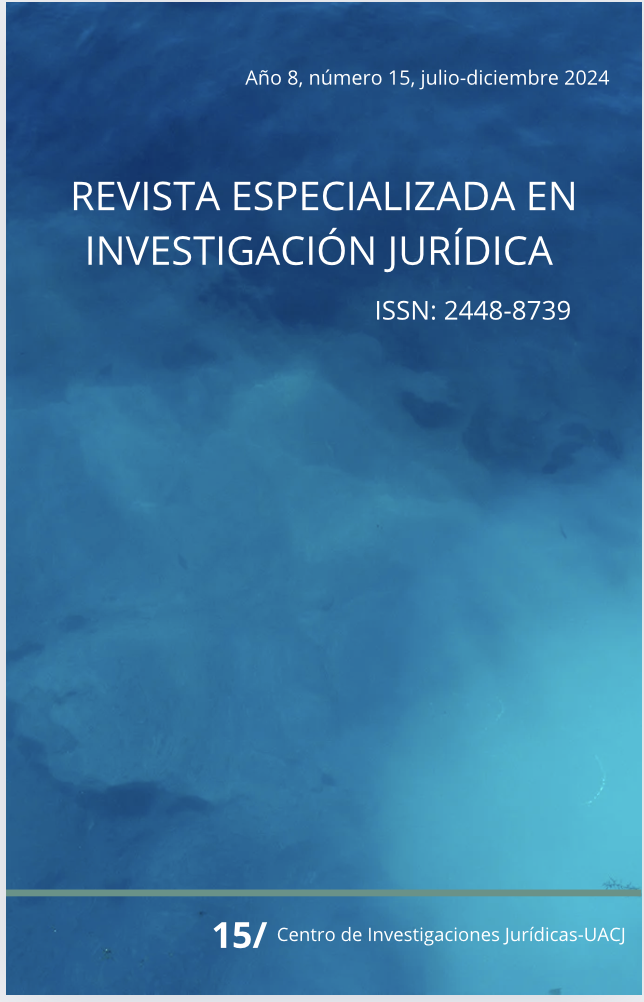Charting the democratic path: A brief history of District Electoral Institutions in Mexico
DOI:
https://doi.org/10.20983/reij.2024.2.1Keywords:
electoral, institutions, history, districtAbstract
Electoral institutions in Mexico have undergone a tumultuous journey throughout their history, reflecting the constant struggle for democracy and electoral justice in the country. This article analyses the development of these institutions from the 19th century to the 21st-century reforms. The objective of the article is to analyze the evolution of electoral institutions in Mexico, identifying significant changes and current challenges. Using a legal history methodology, it examines relevant norms, laws, and decrees, considering each era’s political and social contexts. The results highlight significant transformations in the design and functions of electoral institutions and persistent challenges, such as the influence of organized crime and inequality in political participation. The conclusion emphasizes the need for ongoing reforms to strengthen the integrity and legitimacy of electoral processes in Mexico.
Downloads
References
Ai Camp, R. (1995). La política en México. México: Siglo XXI.
Dedieu, J. P. (2000). Procesos y redes. La historia de las instituciones administrativas de la época moderna. Estudios de historia institucional, 13-30.
Freidenberg, F. (2022). Reformas electorales en América Latina. México: UNAM-IECM.
Langston, J. (2017). Democratization and Authoritarian Party Survival. Mexico’s PRI. Nueva York: Oxford University Press.
Loaeza, S. (2016). Oposición y democracia. México: INE.
Meyer, L. (2013). Nuestra tragedia persistente: La democracia autoritaria de México. México: Debate.
Orozco, H. J. (1998). Evolución del derecho electoral en México durante el siglo XIX. México: UNAM.
Schedler, A. (2016). La política de la incertidumbre en los regímenes electorales autoritarios. México: FCE.
Tapia Fonseca, M. (11 de marzo de 2023). México a través de su legislación electoral. Congreso REDIPAL Virtual, págs. 1-14.
Ugalde, L. C., & Hernández Quintana, S. (2020). Elecciones, justicia y democracia en México. Fortalezas y debilidades del sistema electoral, 1990-2020. México: TEPJF.
Legislativas
Bases Orgánicas 1843. (18 de marzo de 2024). Obtenido de https://www.diputados.gob.mx/biblioteca/bibdig/const_mex/bases-1843.pdf
Constitucón Federal de los Estados Unidos Mexicanos 1857. (18 de marzo de 2024). Obtenido de http://www.ordenjuridico.gob.mx/Constitucion/1857.pdf
Constitución 1917. (19 de marzo de 2024). Obtenido de https://www.constitucionpolitica.mx/versiones-anteriores/1917
Constitución Apatzingán 1814. (18 de marzo de 2024). Obtenido de https://www.diputados.gob.mx/biblioteca/bibdig/const_mex/const-apat.pdf
Constitución de Cádiz 1812. (18 de marzo de 2024). Obtenido de https://www.diputados.gob.mx/biblioteca/bibdig/const_mex/const_cadiz.pdf
Constitución de 1824. (19 de marzo de 2024). Obtenido de https://www.diputados.gob.mx/biblioteca/bibdig/const_mex/const_1824.pdf
Constitución Política de los Estados Unidos Mexicanos. (2024). México: Porrúa.
Ley Órganica Electoral 1857. (19 de marzo de 2024). Obtenido de https://www.memoriapoliticademexico.org/Textos/3Reforma/1857LOE.html
Ley General de Instituciones y Procesos Electorales. (2024). México: Orden Jurídico.
Siete Leyes Constitucionales 1836. (18 de marzo de 2024). Obtenido de https://www.diputados.gob.mx/biblioteca/bibdig/const_mex/const_1836.pdf
Downloads
Published
Issue
Section
License
Copyright (c) 2024 Juan Pablo Bolio Ortiz

This work is licensed under a Creative Commons Attribution-NonCommercial-ShareAlike 4.0 International License.
El titular de los derechos de explotación de los contenidos de la Revista Especializada en Investigación Jurídica es el Autor o Autora
El licenciamiento bajo el cual se publican los contenidos es Atribución-NoComercial-CompartirIgual 4.0 Internacional (CC BY-NC-SA 4.0) por lo que se autoriza compartir, copiar y redistribuir el material en cualquier medio y formato, adaptar, remezclar, transformar y construir a partir del material para cualquier propósito, siempre y cuando no sea con fines comerciales y se cite al autor(es) original y a la fuente, proporcione la liga a la licencia Creative Commons e indique claramente si se hicieron cambios a la obra y especifique cuales fueron dichos cambios. Para más información consultar el apartado de Política de Acceso Abierto de la revista.

















